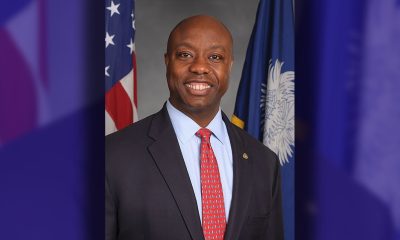City Government
Oakland Steps Out for Faith with a Joyful Noise
The city of Oakland has long been considered the citadel for progressive civil rights and political movements involving activism for racial and social inclusion and equity.
In response to neighbors’ complaints about the loud sounds of music coming from churches, ministers and churches called for a public demonstration of respect for its churches instead of using the police and fines to punish their congregations.
More than 30 pastors stood in solidarity with Pleasant Grove Baptist Church. They were joined by city and county officials along with the SambaFunk! drummers, church choirs, gospel soloists and Black Arts groups.
True to its radical and revolutionary roots, Oakland is redefining respect for religion. Ministers called for the city to declare itself, to be a sanctuary city for its sanctuaries.
The First Amendment and religious freedom were embraced by a coalition that included the Oakland NAACP, the Post News Group, Baptists, Methodists, Muslims, Mormons, COGICs, AME, Catholics, the Black Arts Movement, Soul of Oakland, Oakland Private Industry Council, Pastors of Oakland, Baptist Ministers Union, Seventh-day Adventists and many others.
The event took place Saturday, Nov. 7 in front of the Pleasant Grove Baptist Church on Adeline Street in West Oakland. It was the response to a city noise complaint against Pleasant Grove that kicked off the current solidarity movement.
Speaking at the event, Amos Brown of the Third Baptist Church in San Francisco said his church has faced similar attempts to silence worship.
He told the crowd that earlier this year “two rogue cops” entered his church one afternoon to tell parishioners to quiet down during a service, where a gumbo band was playing in honor of a church member who had passed away.
But he told the police: “We are going to sing, we are going to shout. We’re going to let nobody tell us to shut up.”
The arts community and the religious community are coming together, said Theo Williams of the SambaFunk! drummers, who performed at the event.
“We came here to stand with you in solidarity,” he said. “This is monumental.”
Said Mayor Libby Schaaf, who spoke after Theo Williams, “This city has some strong roots, and these roots are in our faith community and our arts community.”
“My city has some SambaFunk!,” she said.
City Councilmember and Vice Mayor Rebecca Kaplan, who is a rabbi, urged people to raise their voice and sing out in praise.
“It is a miracle that we are still here to sing praises,” said Kaplan, referring to the holocausts faced by Black people during the Middle Passage, Jews during World War II and indigenous people in the United States during the Trail of Tears.
“We give thanks that we have survived to this day,” she said. “Let us use this as a force to unite.”
Bishop Joseph Simmons of Greater St. Paul Baptist Church praised church and community members who have spoken up about attacks on the right to worship.
“I want to thank the people who complained because your complaints made us stand up,” he said.
Rev. Ray Williams of Morning Star Baptist Church said people have to stand up to forces that want to push them out of the city.
“We used to steal away to Jesus to worship,” he said. “(But) we aren’t going to steal away anymore. We’re here to take back what gentrification has taken away from us.”
“We need our council members to have the courage to challenge chase bank for reneging on it’s promise to Oakland,” said Post publisher Paul Cobb.
Activism
Oakland Post: Week of December 31, 2025 – January 6, 2026
The printed Weekly Edition of the Oakland Post: Week of – December 31, 2025 – January 6, 2026

To enlarge your view of this issue, use the slider, magnifying glass icon or full page icon in the lower right corner of the browser window.
Activism
Oakland Post: Week of December 24 – 30, 2025
The printed Weekly Edition of the Oakland Post: Week of – December 24 – 30, 2025

To enlarge your view of this issue, use the slider, magnifying glass icon or full page icon in the lower right corner of the browser window.
Alameda County
Oakland Council Expands Citywide Security Cameras Despite Major Opposition
In a 7-1 vote in favor of the contract, with only District 3 Councilmember Carroll Fife voting no, the Council agreed to maintain its existing network of 291 cameras and add 40 new “pan-tilt-zoom cameras.”

By Post Staff
The Oakland City Council this week approved a $2.25 million contract with Flock Safety for a mass surveillance network of hundreds of security cameras to track vehicles in the city.
In a 7-1 vote in favor of the contract, with only District 3 Councilmember Carroll Fife voting no, the Council agreed to maintain its existing network of 291 cameras and add 40 new “pan-tilt-zoom cameras.”
In recent weeks hundreds of local residents have spoken against the camera system, raising concerns that data will be shared with immigration authorities and other federal agencies at a time when mass surveillance is growing across the country with little regard for individual rights.
The Flock network, supported by the Oakland Police Department, has the backing of residents and councilmembers who see it as an important tool to protect public safety.
“This system makes the Department more efficient as it allows for information related to disruptive/violent criminal activities to be captured … and allows for precise and focused enforcement,” OPD wrote in its proposal to City Council.
According to OPD, police made 232 arrests using data from Flock cameras between July 2024 and November of this year.
Based on the data, police say they recovered 68 guns, and utilizing the countywide system, they have found 1,100 stolen vehicles.
However, Flock’s cameras cast a wide net. The company’s cameras in Oakland last month captured license plate numbers and other information from about 1.4 million vehicles.
Speaking at Tuesday’s Council meeting, Fife was critical of her colleagues for signing a contract with a company that has been in the national spotlight for sharing data with federal agencies.
Flock’s cameras – which are automated license plate readers – have been used in tracking people who have had abortions, monitoring protesters, and aiding in deportation roundups.
“I don’t know how we get up and have several press conferences talking about how we are supportive of a sanctuary city status but then use a vendor that has been shown to have a direct relationship with (the U.S.) Border Control,” she said. “It doesn’t make sense to me.”
Several councilmembers who voted in favor of the contract said they supported the deal as long as some safeguards were written into the Council’s resolution.
“We’re not aiming for perfection,” said District 1 Councilmember Zac Unger. “This is not Orwellian facial recognition technology — that’s prohibited in Oakland. The road forward here is to add as many amendments as we can.”
Amendments passed by the Council prohibit OPD from sharing camera data with any other agencies for the purpose of “criminalizing reproductive or gender affirming healthcare” or for federal immigration enforcement. California state law also prohibits the sharing of license plate reader data with the federal government, and because Oakland’s sanctuary city status, OPD is not allowed to cooperate with immigration authorities.
A former member of Oakland’s Privacy Advisory Commission has sued OPD, alleging that it has violated its own rules around data sharing.
So far, OPD has shared Flock data with 50 other law enforcement agencies.
-

 Bay Area3 weeks ago
Bay Area3 weeks agoPost Salon to Discuss Proposal to Bring Costco to Oakland Community meeting to be held at City Hall, Thursday, Dec. 18
-

 Activism3 weeks ago
Activism3 weeks agoMayor Lee, City Leaders Announce $334 Million Bond Sale for Affordable Housing, Roads, Park Renovations, Libraries and Senior Centers
-

 Activism4 weeks ago
Activism4 weeks agoOakland Post: Week of December 10 – 16, 2025
-

 Activism3 weeks ago
Activism3 weeks agoOakland School Board Grapples with Potential $100 Million Shortfall Next Year
-

 Arts and Culture3 weeks ago
Arts and Culture3 weeks agoFayeth Gardens Holds 3rd Annual Kwanzaa Celebration at Hayward City Hall on Dec. 28
-

 Activism3 weeks ago
Activism3 weeks ago2025 in Review: Seven Questions for Black Women’s Think Tank Founder Kellie Todd Griffin
-

 Advice3 weeks ago
Advice3 weeks agoCOMMENTARY: If You Don’t Want Your ‘Black Card’ Revoked, Watch What You Bring to Holiday Dinners
-

 Activism3 weeks ago
Activism3 weeks agoAnn Lowe: The Quiet Genius of American Couture


























































